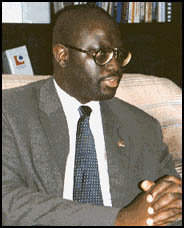 THE TRADE GATEWAY PROJECT, A HOME FOR INVESTMENT THE TRADE GATEWAY PROJECT, A HOME FOR INVESTMENT |
The Gambia has made great strides forward in consolidating its credentials as a trade and industry-oriented nation. It is moving fast towards becoming an incentive-laden market economy with very attractive indices that should successfully lure substantial foreign direct investments. The strategic location and socio-political stability has long established the country as a safe, secure and attractive place to do business, concretising which the country has designed a unique 'Trade Gateway Project' expected to establish it as the most conducive marketing springboard into West Africa.
The Trade Gateway Project is aimed at establishing free zones at sites around the seaport, airport and other strategic locations around the capital city, Banjul, and designed to operate within a tax and duty-free environment with fiscal and other incentives accorded to investors. Numerous activities are covered in the initiative, which is billed for formal inauguration by January 2001. They include manufacturing, processing, packaging, transhipment and distribution of goods. Other facilities within the zone will allow warehousing and storage; breaking bulk; sorting, cleaning and grading, labelling and repackaging; simple processing and assembly; marketing; reshipment; mail order; freight forwarding and teleport activities. The incentives are unique to The Gambia; tax exemptions on profit and dividends. Free repatriation of profits in a free foreign exchange market; exemption form customs duty, sales taxes and turnover tax, reduced port handling charges for goods destined for re-export and access to the local market. The government has also provided a broad list of priority investments, which would enjoy wider incentives, such as free allocation of land, and about 3 years tax holiday.

Though the local market is small, the feasibility of the Trade Gateway Project is reinforced by The Gambia's membership of World Trade Organisation (WTO); its proximity to European and American markets and membership of the Economic Community of West African States, ECOWAS, which accords it the privilege of selling direct and unhindered to the entire West Africa sub-region of 270 million people and annual trade turnover of US$ 200bn. Free trade and bilateral agreements between The Gambia and other countries both at the public and private sector levels will also ensure that the dream of becoming a regional marketing rub is fulfilled. Examples of such agreements include the recent memoranda of understanding signed between the government of The Gambia, Senegal and Guinea Bissau, which would effectively break down all barriers to cross-border trade. Another is the agreement between The Gambia Ports Authority and the Taichung Ports Authority of Taiwan, which is aimed at creating a strong link of partnership between the two ports. Evergreen Lines of Taiwan, the world's second largest fleet, also has a bilateral understanding with the GPA, if and when it materialises, The Gambia could become the second country in the whole of Africa covered by Evergreen. This should enhance and improve export movement to all parts of Asia and create a superb window for African goods in that part of the world.
| The legal system is also very stable and in tandem with standards all over the world. There is a constitutional guarantee protecting investments against nationalization and expropriation, Gambia's membership and subscription to the regulations of the Multilateral Investment Guarantee Agency (MIGA) (www.miga.org), which essentially upholds the protection of investments against non-commercial losses and deference to international arbitration, is itself a guarantee. A commercial court, resourced by personnel trained by international standards and supervised by the World Bank will ensure amicable settlements of commercial disputes.

Local business people have strong links with Africa and adequately understand the region's business intricacies, all of which makes a Gambian partner or agent a particularly viable ally. Mustapha Njie, CEO of TAF Construction Limited, is one such. With vast experience as an Executive member of the sub-regional West African Enterprise Network (WAEN) and member of a larger continental grouping, he understands the logic of partnership. "We must be and we are open to joint venture offers. Whatever we do, we can do better with a partner and with more human, material and financial resources," he remarks.
The workforce is flexible, creative and motivated. Relative low labour costs combined with a high level of productivity represent another attraction. There are a good number of expatriate professionals in the country giving investors an ample room for choice. With a strong cultural background and a hospitable environment, it won't take long before investors come to see the country as a home away from home, a true haven for investments.
Drawing the point home, Musa Hassan Sillah, Secretary of State for Trade, Industry and Employment said, "I would urge the private sector and foreign investors to exploit the great potential of our competitive advantages, the government is committed and will maintain its commitment to industrial and economic growth". |

